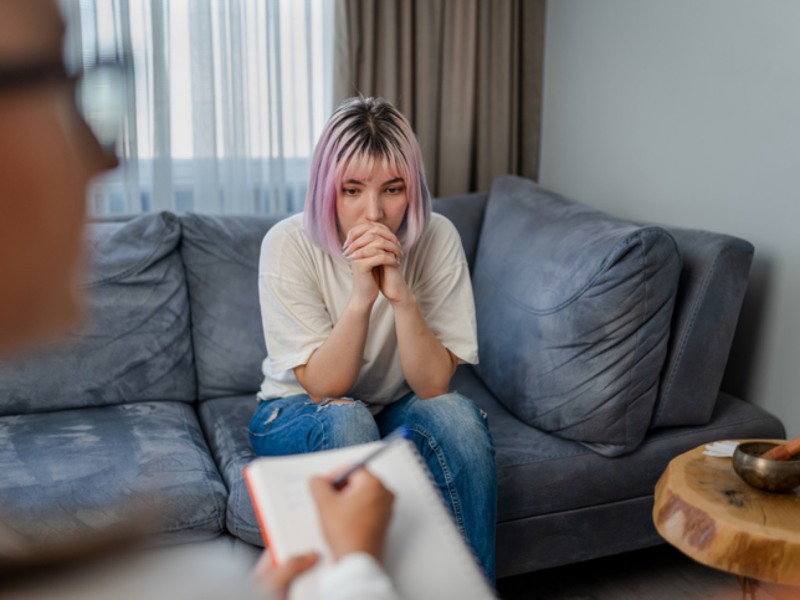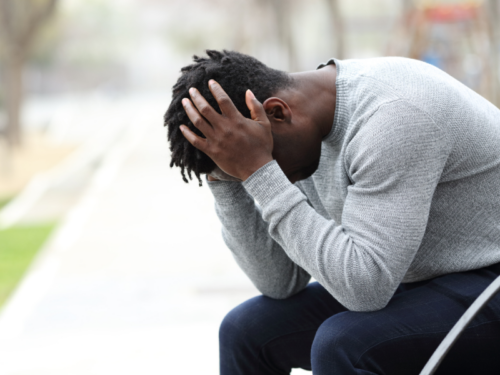
Table of Contents
9 Tips for How to Cope With a Depressive Episode
Written By: Charlie Health Editorial Team

Clinically Reviewed By: Dr. Don Gasparini
October 30, 2023
7 min.
Plus more information on what qualifies as a depressive episode, what causes a depressive episode, and how to cope with depression triggers.
Learn more about our Clinical Review Process
Table of Contents
Trigger warning: Suicide, self-harm. If you’re experiencing suicidal thoughts or are in danger of harming yourself, this is a mental health emergency. Contact The Suicide & Crisis Lifeline 24/7 by calling or texting 988.
How to cope with a depressive episode
Coping with a depressive episode can be challenging, but there are several strategies that may help. Remember, everyone’s experience with depression is unique, and what works for one person may not work for another. Here are 9 tips for how to cope with a depressive episode:
Seek professional help
If you suspect you’re experiencing a depressive episode, it’s crucial to reach out to a mental health professional. They can provide you with a proper diagnosis and treatment options. In some cases, medication prescribed by a healthcare professional may be necessary to manage depressive symptoms. If prescribed, take medications as directed. It’s essential to seek professional guidance to develop a personalized plan for managing your depressive episode. You don’t have to go through it alone, and there is help available.

Healing from depression is possible
Charlie Health offers depression treatment designed for you.
Stay safe
Severe depression can be life threatening. If you ever have thoughts of self-harm or suicide, reach out for immediate help. Call a crisis hotline, like 988 the 24/7 Suicide & Crisis Lifeline, or go to your nearest emergency room.
Talk to someone you trust
In addition to seeking help from a mental health professional, it can be helpful to share your feelings and thoughts with a trusted friend or family member. Talking about what you’re going through can provide emotional support and help you feel less alone. Although depression may make you want to isolate yourself, try to stay connected with friends and family. Social support is essential.
Stay informed
Learn about depression and depression symptoms so you can better understand what you’re going through. Knowledge can be empowering. For instance, you can try writing down your thoughts and feelings to help you track your depressed mood and identify patterns (to later discuss with a mental health professional).
Practice self-care
Take care of your basic needs. Try to eat balanced meals, get enough sleep, and engage in regular physical activity. Research consistently shows how physical health is closely connected to mental health. Also, even if you don’t feel like it, try to engage in activities you once enjoyed. Doing things that make you happy can improve your mood.
Break tasks into smaller steps
When you’re feeling overwhelmed, break down tasks into smaller, manageable steps. This is a way to avoid setting overly ambitious goals and instead set achievable goals. Completing even a small task can give you a sense of accomplishment and help prevent feelings of failure.
Limit stress
Identify and reduce sources of stress in your life. This might involve setting boundaries, saying “no” to additional commitments, or seeking help with stressors when possible. Techniques like deep breathing, meditation, or progressive muscle relaxation can also help reduce anxiety and stress.
Avoid alcohol and drugs
Substance use can worsen depression. Avoid alcohol and recreational drugs, as they can exacerbate your symptoms.
Be patient with yourself
Understand that recovery from a depressive episode can take time. Be patient with yourself and remember that it’s okay to have setbacks.
What qualifies as a depressive episode?
A depressive episode is a period characterized by persistent and severe depressive symptoms. It is one of the key components of major depressive disorder (MDD), but it can also occur in other mood disorders like bipolar disorder. Here are some of the key characteristics that qualify as a depressive episode:
- Feeling persistently sad, empty, or experiencing a pervasive sense of hopelessness for most of the day, nearly every day.
- A marked decrease in interest or pleasure in most activities that were once enjoyed, including hobbies and social interactions.
- Significant changes in appetite and weight, either a noticeable increase or decrease, which can lead to significant changes in body weight.
- Changes in sleep patterns, such as insomnia (difficulty falling asleep or staying asleep) or hypersomnia (excessive sleeping), nearly every day.
- Feeling constantly tired, fatigued, or lacking energy, even after a full night’s sleep.
- Ongoing feelings of worthlessness, guilt, or self-blame often about things that are not your fault or are minor in nature.
- Difficulty thinking clearly, making decisions, or concentrating on tasks.
- Experiencing restlessness or slowed speech and body movements.
- Experiencing physical symptoms like headaches, digestive problems, and aches and pains that do not have a clear physical cause.
- Recurrent thoughts of death, dying, or suicidal ideation, which may include making specific plans for suicide or attempting suicide.
To be diagnosed with a depressive episode or major depressive disorder (MDD), these symptoms must significantly impair daily functioning and persist for at least two weeks. It’s important to note that depressive episodes can vary in intensity and duration from person to person.
As mentioned, if you or someone you know is experiencing these symptoms, it is essential to seek help from a mental health professional. Depression is a treatable mental health condition, and with the right support and treatment, many individuals can experience improvement in their symptoms and overall quality of life.
What causes a depressive episode?
Biological factors
Psychological factors
Environmental factors
Medical conditions
Life events
- Genetics
- Brain chemistry
- Hormonal changes
- Stress
- Trauma
- Negative thinking patterns
- Social isolation
- Substance abuse
- Seasonal changes
- Chronic pain
- Cancer
- Thyroid disorders
- The loss of a loved one
- Divorce
- Job loss
Depressive episodes can have various causes and contributing factors, including biological, psychological and environmental factors. Certain medical conditions and life events may also cause depressive episodes. Treatment for depression often involves a combination of psychotherapy, medication, and lifestyle changes to address these factors and manage the condition effectively.
It’s important to note that depression is a complex mental health condition, and individual experiences may vary, meaning different people may have different combinations of these factors contributing to their depressive episodes. Some common factors that can contribute to depressive episodes include:
Biological factors
- Genetics: Family history of depression can increase the risk.
- Brain chemistry: Imbalances in neurotransmitters like serotonin, norepinephrine, and dopamine can play a role.
- Hormonal changes: Fluctuations in hormone levels can play a role, as seen in postpartum depression (PPD), a specific form of depression that occurs after giving birth.
Psychological factors
- Stress: Chronic or severe stressors, such as work-related stress or personal conflicts, can trigger depression.
- Trauma: Experiencing trauma, such as physical or emotional abuse, can contribute to depression.
- Negative thinking patterns: Prolonged negative thought patterns and self-criticism can perpetuate depressive symptoms.
Environmental factors
- Social isolation: Lack of social support and loneliness can increase the risk.
- Substance abuse: Alcohol and drug abuse can lead to or exacerbate depressive episodes.
- Seasonal changes: Some people experience seasonal affective disorder (SAD) during specific times of the year, often in the winter when there’s less natural light.
Medical conditions
- Certain medical conditions or chronic illnesses, such as chronic pain, cancer, or thyroid disorders, can lead to depressive symptoms.
Life events
- Major life events such as the loss of a loved one, divorce, or job loss can trigger depressive episodes, particularly if there’s a lack of coping mechanisms in place.
Coping with your depression triggers
Coping with depression triggers involves identifying the specific situations, thoughts, or events that tend to worsen your depression symptoms and developing strategies to manage or avoid them. This may help limit the intensity and frequency of depressive episodes. Remember that coping with depression triggers is a process that may require time and effort. It’s okay to ask for help and take small steps toward managing your triggers. The goal is to reduce their impact on your life and improve your overall well-being. Here are some steps you can take to cope with your depression triggers.
Identify your triggers
Pay close attention to your thoughts, feelings, and situations that seem to trigger or worsen your depression. Keep a journal to track these triggers over time. Continuously monitor how well your coping strategies are working. If you find that certain triggers remain a significant problem, consider adjusting your approach or seeking additional help.
Emergency plan
Create a crisis plan for how to manage particularly difficult triggers or moments when you feel overwhelmed. This could include contacting a crisis hotline, reaching out to a trusted friend, or going to an emergency room if necessary. Charlie Health’s Crisis Toolkit can be a helpful resource for creating this emergency plan.

Create a support system
Talk to friends and family about your triggers and ask for their support. Sometimes, just sharing your feelings with someone you trust can be therapeutic.
Develop a routine
Establishing a daily routine can provide structure and stability in your life, which can be particularly helpful in managing triggers.
Challenge negative thoughts
When you encounter thoughts that contribute to your depression, try to challenge and reframe them with more positive or realistic ones.
Practice self-compassion
Be kind to yourself. Understand that it’s normal to have triggers, and setbacks may occur. Treat yourself with the same compassion you would offer to a friend going through a tough time.
Support for depressive episodes at Charlie Health
If you’re struggling with a depressive episode, Charlie Health is here to help.
Our virtual Intensive Outpatient Program (IOP) offers more than once-weekly counseling to young people with complex mental health conditions and their families—including young people struggling with severe depression, postpartum depression, and other kinds of depression. Charlie Health’s expert clinicians offer tips for managing depression and times of depressed mood in group sessions, individual counseling, and family therapy contexts.
Fill out this short form to see today if Charlie Health is a fit.
References





